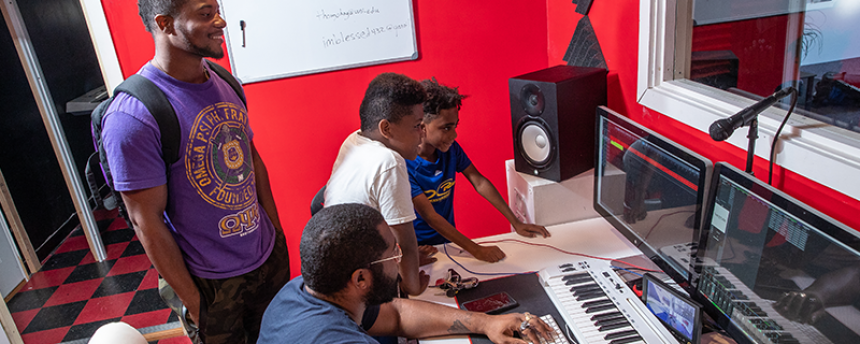Hip Hop Literacy: A Rhythmic Road to Learning

Got a big vocab
Got to put it to use
I’m a god like Zeus
I’m not obtuse
I got the juice
Ain't no excuse
If you got a gift, then you should use it
Put your thoughts into the music.
-- Sher'Quarion W.
Four groups of 5- to 14-year-olds are hard at work at Cunningham Elementary in Waterloo this summer.
First, they choose a beat, then a topic. Next comes brainstorming words and phrases, looking up synonyms on their Chromebooks.
Drafting, editing, revising follows. Organizing from beginning to end with purpose. Publishing a full eight stanzas in their notebooks. Then time to memorize and practice projecting their voices.
Finally, recording at The Studio in Waterloo. Groups of one, two, three or more take their turn around the microphone in the vocal booth. The engineer on the other side of the glass in the control room records and mixes the tracks from many into one.
Hip Hop Literacy Camp is back.
Different expression, same process
For three years, the UNI College of Education and the Waterloo Community School District have partnered on this camp. It’s an outgrowth of community efforts begun at a local church by Emeritus professor Al Hayes. Leading the effort are Shuaib Meacham, associate professor in literacy education, and Lamont Muhammad, a fifth grade Waterloo teacher who has written and performed music for years himself.
The dictionary definition of literacy is “the ability to read and write.” Hip hop requires both.
“You use the same writing tools for hip hop as for traditional writing. The expression is different, but the process is the same,” Muhammad says. “As important, the students are also reading; the two go hand in hand.”
Meacham says the added element of performance is something new for these kids compared to his experience on the East Coast. “Here, recording is something that someone else does,” he explains. “Often there is that trepidation in the recording studio. We build their confidence up, encourage them. They do that first one, and then they hear themselves and hear how good they sound, and want to do more.”
Four UNI students from different backgrounds assisted at the camp. Each has a different background, but their interests intersect with kids, music and words. Marcus Jackson is a senior in vocal music education; Stephen Church, leisure, youth and human services; Dylan Hutzel, English education; and Hunter Thompson, English.
“We’re able to captivate their attention, relating literacy to something they’re already interested in,” says Church, a three-year participant who now finds his career interests drawn more toward working with younger kids. “You work with them, and then the light bulb goes off, and they don’t even realize what’s going on!”
The students take on a group identity -- YBG (Young Bold and Gifted) Dynasty, Trap Royalty, Game Changers and Flow Nation. They write and record five to six raps following a weekly theme (for example, community). They also hear from guest speakers and perform community service. In addition to pop-up performances at Sidecar Coffee, the students close out camp with a public performance their last day.
“It brings me joy to merge hip hop with education. You see students record and perform--and you see their reactions,” Muhammed says. “They see themselves as writers of actual content. They are authors. I like seeing their confidence.”
Hip hop literacy goes international
Hip Hop Literacy went international in the past year, when members of the Hip Hop Literacy group performed at the Hangzhou Citizens Leisure Festival in October 2018.
“In China, the global demand of US hip hop was a real source of fascination,” Meacham says. “We had the youngest group there, yet had teenagers looking for our kids in hallways and wanting to know them better.”
Though the trips were not coordinated by UNI, the McElroy Trust provided support to help make the China trip possible. The group has been invited to perform again this year.
